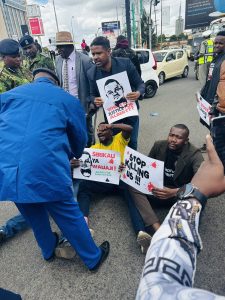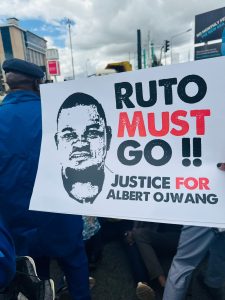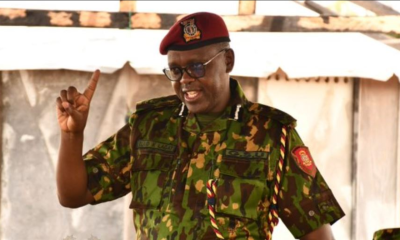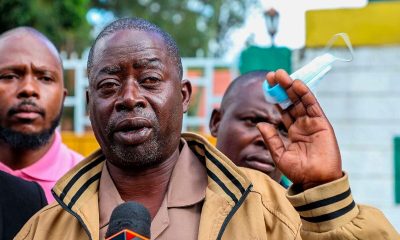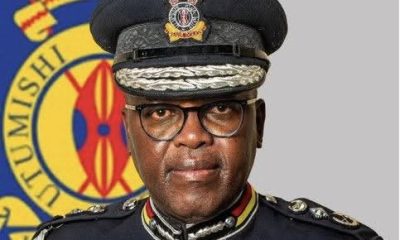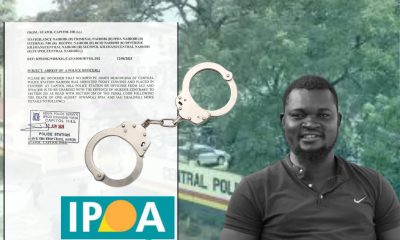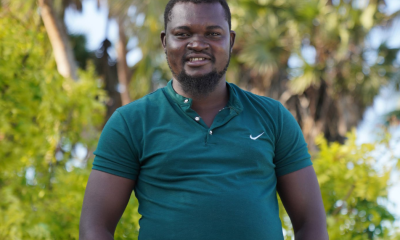News
Protesters Chanting ‘Ruto Must Go’ Block City Mortuary as Calls for Justice Mount Over Albert Ojwang’s Death in Police Custody
Among the prominent figures leading Monday’s demonstration were activist Hanifa Adan, Vocal Africa CEO Hussein Khalid, university student leader Joshua Okayo, and scholar-turned-activist Fred Ogola.
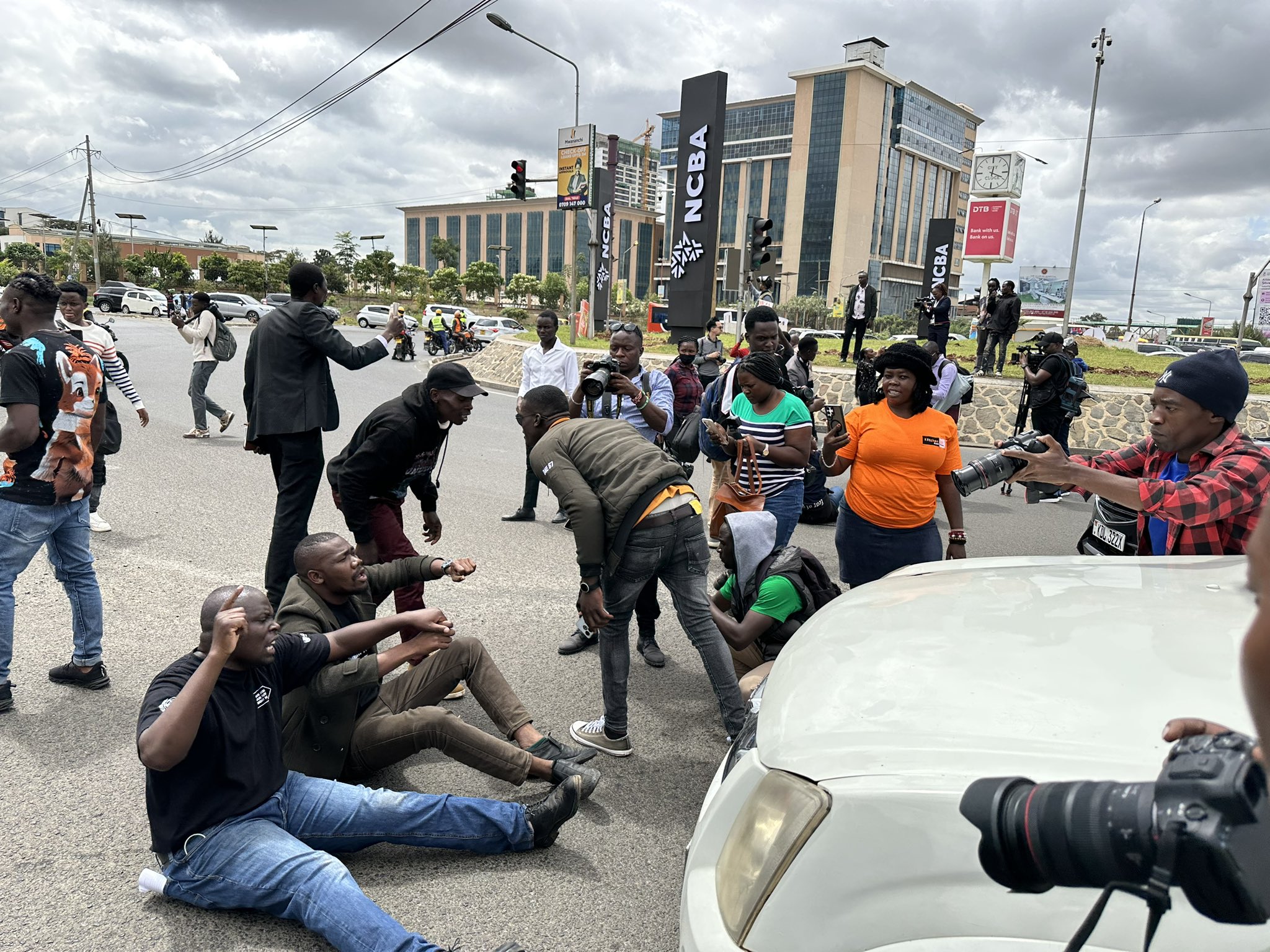
NAIROBI, Kenya – Dozens of activists took to the streets around City Mortuary on Monday, blocking traffic and demanding justice for social media influencer Albert Ojwang, who died while in police custody under controversial circumstances.
The protesters, many armed with cameras, staged a dramatic standoff at the roundabout near Nairobi Funeral Home (formerly City Mortuary), effectively shutting down a key section of Ngong Road that leads to Mbagathi Hospital.
Their chants of “Ruto must go” and “We want justice for Ojwang” echoed through the area as tensions escalated throughout the day.
Albert Ojwang, a Kiswahili and Religious Studies teacher who had gained prominence as a social media influencer, died early Sunday morning while detained at Central Police Station in Nairobi.
The 32-year-old had been arrested Friday in his home county of Homa Bay, then transported over 400 kilometers to the capital for questioning over alleged defamatory posts targeting Deputy Inspector General of Police Eliud Lagat.
The circumstances surrounding Ojwang’s death have drawn fierce criticism and skepticism from the public. Police initially claimed he died from self-inflicted head injuries after hitting his head against his cell wall, but this account has been challenged by new evidence.
Speaking to media on Monday, Ojwang’s family lawyer revealed disturbing details after viewing the body: “The body had a lot of injuries on the head, the hand and the shoulder area. There was a lot of blood oozing from the nose.”
The presence of injuries on his hands and shoulders suggests possible defensive wounds, contradicting the official police narrative of suicide.
Among the prominent figures leading Monday’s demonstration were activist Hanifa Adan, Vocal Africa CEO Hussein Khalid, university student leader Joshua Okayo, and scholar-turned-activist Fred Ogola.
Their demands went beyond seeking justice for Ojwang to calling for broader systemic change.
“Kenyans, united, we shall never be defeated. Ruto must go; Lagat must go. What are we demanding? We are demanding justice,” the protesters chanted as they maintained their blockade of the busy intersection.
Okayo specifically questioned why Ojwang had been transported hundreds of kilometers from his arrest location to Nairobi instead of being processed locally in Homa Bay.
He also called for the immediate arrest and prosecution of the Central Police Station Officer Commanding Station (OCS), whom he identified as the main suspect in the influencer’s death.
Inspector General of Police Douglas Kanja held a press conference Monday at Central Police Station, where he confirmed that Deputy IG Lagat had indeed filed a formal complaint against Ojwang for alleged defamation, leading to his arrest by DCI detectives.
“During a routine cell inspection Ojwang was found unconscious and immediately rushed to the Mbagathi hospital for treatment, upon arrival he was declared dead,” Kanja stated, revising the earlier account of self-inflicted injuries.
In response to the mounting pressure, several officers on duty at Central Police Station during the night of Ojwang’s death have been interdicted pending investigation.
The Independent Policing Oversight Authority (IPOA) has launched a full investigation into the incident.
IPOA Chairperson Isaac Hassan assured the public that justice would be served: “From last night when we got informed about the death of the young man Albert Ojwang, we have already commenced investigations. Our team visited the scene where the death occurred.”
The case has attracted attention from high-ranking political figures, with Deputy President Rigathi Gachagua calling for the dismissal of Deputy IG Lagat.
Human rights organization Amnesty Kenya also issued a statement expressing deep concern over the death, emphasizing that “no Kenyan should lose their life in police custody.”
As protesters maintained their vigil outside, Ojwang’s postmortem examination proceeded inside the mortuary, attended by family members and their legal representatives.
The autopsy results are expected to provide crucial evidence in determining the exact cause of death and whether the injuries were indeed self-inflicted as police claim.
The protest continued into the afternoon, with anti-riot police and regular police units deployed to the area as tensions remained high.
Traffic diversions were implemented around the Ngong Road corridor as authorities worked to manage the situation.
Ojwang’s arrest stemmed from social media posts that Deputy IG Lagat deemed defamatory.
The influencer was initially detained in Homa Bay on Friday, June 6, before being transported to Nairobi for questioning at DCI headquarters on Saturday.
He was subsequently held at Central Police Station, where he was found unconscious during what police described as a routine cell check early Sunday morning.
The case has reignited debates about police accountability and the treatment of detainees in Kenya, with many questioning why a social media post warranted such drastic action and why the suspect died within hours of being in police custody.
As investigations continue and public pressure mounts, the death of Albert Ojwang has become a flashpoint for broader concerns about police conduct and accountability in Kenya, with activists vowing to maintain pressure until those responsible are held accountable.
Kenya Insights allows guest blogging, if you want to be published on Kenya’s most authoritative and accurate blog, have an expose, news TIPS, story angles, human interest stories, drop us an email on [email protected] or via Telegram
-

 Business1 week ago
Business1 week agobetPawa Empire Crumbles: Mr Eazi’s Betting Gambit Unravels Amid Partner’s Shadowy Deals
-

 News6 days ago
News6 days agoDCI Probes Meridian Equator Hospital After Botched Procedure That Killed a Lawyer
-

 Business6 days ago
Business6 days agoMinnesota Fraud, Rice Saga, Medical Equipment Deal: Why BBS Mall Owner Abdiweli Hassan is Becoming The Face of Controversial Somali Businessman in Nairobi
-

 Business1 week ago
Business1 week agoKRA Boss Humphrey Watanga In Big Trouble In Sh5.5 Billion Rice Import Scandal
-

 Investigations2 weeks ago
Investigations2 weeks agoKERRA Homa Bay Region Manager Calvince Thomas Accused of Swindling Businessman Ksh 2 Million in Phantom Tender Deal
-

 Politics6 days ago
Politics6 days agoYour Excellency! How Ida’s New Job Title From Ruto’s Envoy Job Is Likely to Impact Luo Politics Post Raila
-

 Business1 week ago
Business1 week agoState Set to Demolish Pastor Ng’ang’a’s Church in Sh28 Billion Railway City Push
-

 Business1 week ago
Business1 week agoControversial Turkish Firm Celebi Canceled in India Over Security Concerns Acquires Strategic Property in Nairobi’s Main Airport

